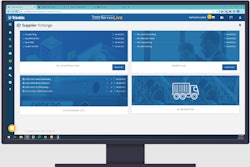
In recent years, the significance of customer relationship management (CRM) technology has become increasingly clear among distributors.
Driven by a desire to provide exceptional customer experiences, distributors have sought a centralized system that can help them manage customer information and maintain team cohesion. Between 2017 and 2022, CRM adoption among distributors saw remarkable growth, jumping from 55% to 72%, according to a DSG study.
Yet hidden beneath this optimistic trend is another essential development that distributors must note: The transition from horizontal to vertical CRMs. Back in 2017, a notable 25% of $50M+ distributors relied on horizontal CRMs, like Salesforce or Dynamics, whereas only 9% employed vertical CRMs crafted specifically for their industry. Fast forward to 2022, and the landscape has undergone a significant transformation. The proportion of distributors using horizontal CRMs dipped to 22%, while those embracing purpose-built distribution CRMs soared to 25%.
This shift toward vertical CRMs seems like a natural progression. At first, distributors gravitated toward well-established CRM platforms like Salesforce and Dynamics, under the impression that what worked for the majority would also work for them. However, it soon became apparent that distributors’ business models diverged considerably from the “one-size-fits-all” approach that generic CRMs offer. As a result, the key trend to observe is that distributors now appreciate the value of a CRM tailored to their specific vertical, empowering them to streamline their operations and serve their customers more effectively.
What is a vertical CRM?
Vertical CRMs are designed to meet the specialized needs of an industry and business type. Vertical CRMs enable you to truly improve customer understanding and enhance sales at every layer of your nuanced business.
Vertical-specific CRMs aren’t a novel concept. Lawyers use Clio, insurance agents use RadiusBob, and even nonprofits have Neon One. These vertical CRMs offer functionality designed with these industries in mind to enhance workflows, provide better customer insights, and improve sales processes.
Benefits of a vertical CRM:
- Tailored Features and Functionality: Vertical-specific CRMs are designed with the unique needs and challenges of a particular industry in mind. This means that they include specialized features and functionalities that are tailored to address the specific requirements and pain points of businesses operating within that sector. As a result, users benefit from a more efficient and streamlined workflow, as well as tools that are more likely to drive value for their particular business context.
- Faster Implementation and Adoption: Because vertical-specific CRMs are built to cater to a specific industry, they often require less customization and configuration during the implementation process. This can lead to quicker deployment times and a smoother onboarding experience for users, as they will be working with a system that already aligns with their industry's best practices and processes. This familiarity can also contribute to higher user adoption rates and greater overall satisfaction with the CRM solution.
- Industry-Specific Expertise and Support: CRM providers that focus on a specific vertical typically possess a deeper understanding of the industry's nuances, trends, and regulations. This expertise is often reflected in the quality of the customer support and training they offer, as well as their ability to provide valuable insights and recommendations for best practices. Moreover, vertical-specific CRM vendors are more likely to stay up-to-date with industry changes and continuously improve their products to meet evolving business needs, ensuring that their clients remain competitive in their respective markets.
Why don’t horizontal CRMs work for distributors?
The complexities of sales and customer relationships in the distribution industry are not well-served by the blunt tool that is a horizontal CRM. It shouldn’t surprise you that many distributors who opted for a generic CRM like Salesforce or Dynamics are dissatisfied.
Horizontal CRMs lack the granularity necessary for revenue generation in the distribution industry.
Horizontal CRMs:
- Don’t accommodate rich product data for distributors’ extensive catalogs. Distributors have hundreds of thousands of SKUs in their catalog, and sales reps can’t be familiar with them all. Some distribution-specific CRMs can integrate with ERP and PIM to make it possible to display rich product info right in the CRM, which is not possible in a generic CRM. With a click of a button, reps can see a product’s description, whether it’s in stock, when it was last ordered and more.
- Lack industry-specific features for inventory, supply chain, and logistics, which are three areas critical to your success. Even worse, the data housed in horizontal CRMs is backward facing, not predictive or proactive to enable key sales strategies.
- Offer limited integration with your ERP or other distributor-specific, mission-critical functions. This limited integration is a huge miss. Distributors’ ERPs house transactional data points that provide critical information on when, what, and how customers buy your products. The ERP is a gold mine, but distributors need a distribution-focused CRM to harvest and use that data effectively.
- Have poor visibility into customers and their needs because of an inability to integrate seamlessly with ERP (and sometimes PIM, ecommerce, etc.). It’s challenging to offer a superb customer experience as a distributor. With multiple channels, including OSRs, ISRs, CSRs, and ecommerce, and without an ERP integration, these teams can’t get a 360-degree view of what’s happening with a customer to serve them well. This creates a frustrating, disjointed experience for the customer.
- Can’t handle complex pricing structures such as volume discounts, special promotions, and customer-specific pricing. In part, this disconnect is caused by horizontal CRMs not working well with other channels you depend on to run your business.
- Have limited quoting functionality and visibility. Distribution-specific CRM offers quote visibility that far exceeds what’s possible in generic CRMs. With a distribution-specific CRM, sales reps can easily access important info regarding each quote, such as each product’s status (ordered, invoiced or not ordered), the recipient of the quote, whether any follow-ups have been made, and whether customers have visited any of the outstanding products on your ecommerce site. This level of insight empowers sales teams to make informed follow-up decisions and win more business.
Move beyond data entry
Horizontal or generalized CRMs are the square peg in the round hole of distribution. A vertical CRM allows you to stop using expensive CRM platforms as a data-entry system. It’s time to start thinking of CRM as a sales engine that can drive revenue.
Distributors face big sales and customer service challenges. A vertical CRM streamlines workflows and promotes proactive sales initiatives based on predictive analytics, pre-built connections to other tools, first-rate reporting tools – all fueled by actual data from every channel.
Benj Cohen is the founder and CEO of Proton.ai.






















